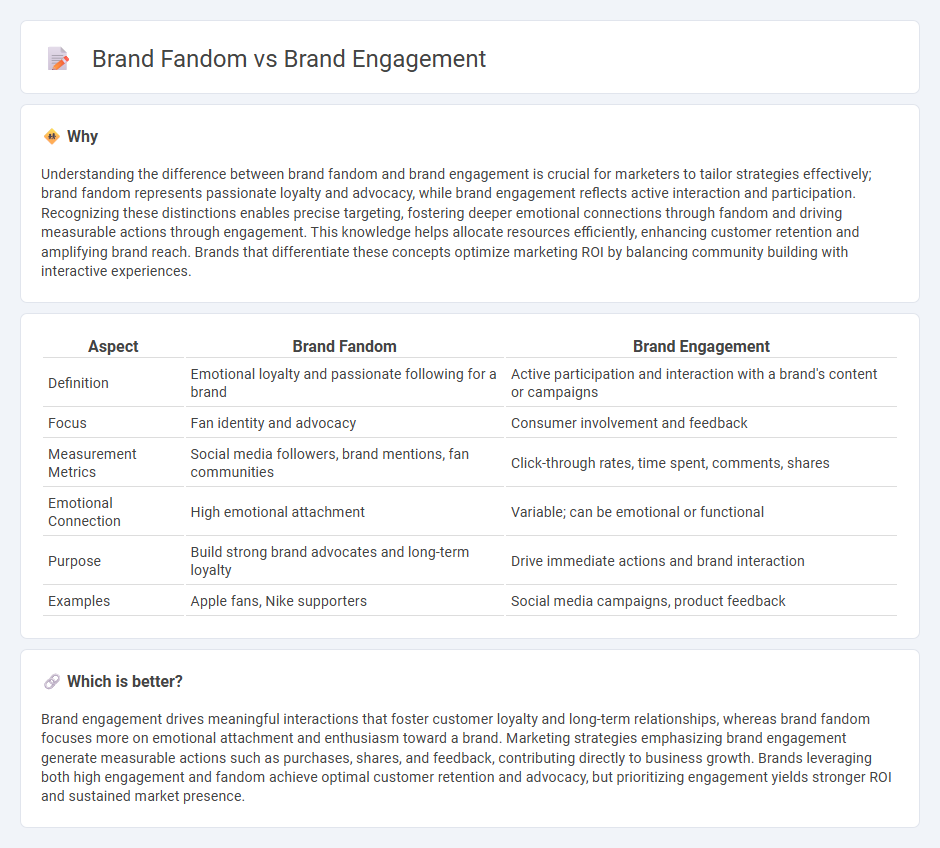
Brand fandom represents a deep emotional connection where customers actively advocate and proudly associate themselves with a brand, often creating communities around shared values. Brand engagement focuses on the interaction between consumers and brands through various touchpoints, aiming to maintain interest and stimulate participation. Explore the differences and benefits of brand fandom versus brand engagement to enhance your marketing strategy.
Why it is important
Understanding the difference between brand fandom and brand engagement is crucial for marketers to tailor strategies effectively; brand fandom represents passionate loyalty and advocacy, while brand engagement reflects active interaction and participation. Recognizing these distinctions enables precise targeting, fostering deeper emotional connections through fandom and driving measurable actions through engagement. This knowledge helps allocate resources efficiently, enhancing customer retention and amplifying brand reach. Brands that differentiate these concepts optimize marketing ROI by balancing community building with interactive experiences.
Comparison Table
| Aspect | Brand Fandom | Brand Engagement |
|---|---|---|
| Definition | Emotional loyalty and passionate following for a brand | Active participation and interaction with a brand's content or campaigns |
| Focus | Fan identity and advocacy | Consumer involvement and feedback |
| Measurement Metrics | Social media followers, brand mentions, fan communities | Click-through rates, time spent, comments, shares |
| Emotional Connection | High emotional attachment | Variable; can be emotional or functional |
| Purpose | Build strong brand advocates and long-term loyalty | Drive immediate actions and brand interaction |
| Examples | Apple fans, Nike supporters | Social media campaigns, product feedback |
Which is better?
Brand engagement drives meaningful interactions that foster customer loyalty and long-term relationships, whereas brand fandom focuses more on emotional attachment and enthusiasm toward a brand. Marketing strategies emphasizing brand engagement generate measurable actions such as purchases, shares, and feedback, contributing directly to business growth. Brands leveraging both high engagement and fandom achieve optimal customer retention and advocacy, but prioritizing engagement yields stronger ROI and sustained market presence.
Connection
Brand fandom drives emotional loyalty, creating a passionate community that actively promotes and defends a brand. This deep emotional investment increases brand engagement, as fans participate in conversations, share content, and advocate through social media and other platforms. High levels of brand engagement, fueled by fandom, lead to stronger customer retention and increased lifetime value.
Key Terms
Emotional Connection
Brand engagement centers on consumer interaction and participation, fostering loyalty through meaningful experiences and active communication with the brand. Brand fandom elevates this relationship, creating passionate emotional connections where consumers become advocates and deeply identify with the brand's values and community. Explore how emotional connection shapes these dynamics to transform casual customers into devoted brand fans.
Community Building
Brand engagement involves active interaction and participation between consumers and a brand, fostering loyalty and trust through meaningful content and experiences. Brand fandom goes further by creating passionate communities where members advocate for the brand, generating organic promotion and deeper emotional connections. Explore strategies to transform engagement into fandom and build thriving brand communities.
Loyalty
Brand engagement measures the interaction level between consumers and a brand, including actions like social media interactions and repeat purchases, reflecting loyalty through consistent consumer interest. Brand fandom goes deeper, embodying emotional attachment and advocacy, where loyal customers actively promote and defend the brand, creating a community around shared values. Explore the key strategies to transform brand engagement into lasting brand fandom and strengthen customer loyalty.
Source and External Links
Brand engagement - Wikipedia - Brand engagement is the process of forming an emotional or rational attachment between a consumer and a brand, influencing customer purchase intentions and involving strategies such as social media interaction to promote brand satisfaction and loyalty.
What Is Brand Engagement and Why Is it Important? - Qualtrics - Brand engagement is about creating emotional connections beyond first contact, as demonstrated by Nike's campaign that significantly increased app usage and revenue by strengthening engagement within its ecosystem.
How To Increase Brand Engagement Across the Board - Shopify - Brand engagement focuses on building a positive emotional connection through personalized experiences, storytelling, and community involvement that enhances loyalty and advocacy, driving long-term business success.
 dowidth.com
dowidth.com